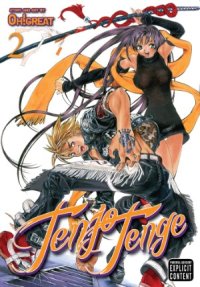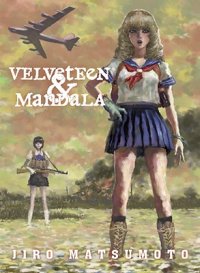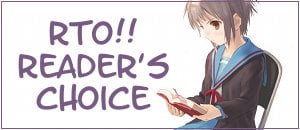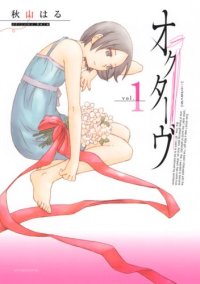RIGHT TURN ONLY!!
Bakuman Battle Brawlers
by Carlo Santos,

I've poked around on the Jmanga website a little bit. I'm not sure how I feel about it yet. Its best feature, right now, is all the series that neither US publishers nor scanlators have ever touched. But as far as logistics—pricing structure, subscription system, and user interface—it's still a work in progress. What remains to be seen, then, is how much progress it makes, and how quickly.
BAKUMAN

Vol. 6
(by Tsugumi Ohba and Takeshi Obata, Viz Media, $9.99)
FROM THE BACK COVER:
"Average student Moritaka Mashiro enjoys drawing for fun. When his classmate and aspiring writer Akito Takagi discovers his talent, he begs Moritaka to team up with him as a manga-creating duo. But what exactly does it take to make it in the manga-publishing world?
Moritaka and Akito's hard work is paying off, and they start challenging their rival Eiji's popularity in Shonen Jump. But just as they plan to take the next step, the team is hit with a surprising setback. Moritaka and Akito will need the help of their manga artist friends to overcome this hurdle!"
EVIDENCE FOR:
The previous volume of Bakuman was too dull—submit a manga chapter, await survey results, repeat endlessly. This one, by comparison, is a much more exciting rollercoaster ride. Early on, Mashiro discovers the health risks of the manga-ka lifestyle, and much of the volume becomes a battle of wills between artist and editor: should Mashiro keep drawing while he recovers, or should he get his rest? The situation hits an even deeper nerve when friends and family are pulled into the storm. Mom shows up to deal with her son, and Miho finally becomes more than just a figurehead girlfriend, explaining the root of her feelings for Mashiro and providing key emotional support. (The hand-holding drawing scene is sure to melt a few hearts.) In the second half, things get even more intense when Mashiro's fellow manga-ka turn against the entire Shonen Jump editorial department—an epic showdown between creators and publishers. And the craziest thing? Obata's art makes every scene buzz with excitement even when it's just people talking and arguing with each other. The varied character designs, their high-spirited expressions, and dynamic poses bring life to even the most ordinary moments.
EVIDENCE AGAINST:
Once again, Bakuman's biggest problem is talk, talk, talk. Exciting as their arguments may be, the characters always seem to take four times as many words as they need to express themselves. This also impacts the artwork negatively, as a lot of pages get overrun by dialogue bubbles, forcing the panels to be all square and boring-looking. Worse yet is when the dialogue starts going in circles, like in the standoff between Editor-in-Chief Sasaki and Mashiro's fellow artists. The conflict just keeps dragging out, chapter after chapter, because neither side wants to give in and they keep yelling the same points at each other. (Sounds like politics, and how much fun is that?...) Meanwhile, the series' central romance continues to ring hollow. Despite an attempt to build up some back-story about Miho, and show how important she is to Mashiro in his darkest moment, she still comes off as a blindly devoted plastic doll—and the contrived "we won't see each other until we achieve our dreams" device doesn't help, either. Is it really that hard to portray a believable supporting cast instead of these caricatures?
FINAL VERDICT:
Despite the story's quirks and failings, the up-and-down emotional battles in this volume are exciting enough to pick up a B.
BLOODY MONDAY

Vol. 1
(by Ryou Ryumon and Kouji Megumi, Kodansha Comics, $10.99)
FROM THE BACK COVER:
"Takagi Fujimaru may seem like a regular high school student, but behind the cheery facade lies a genius hacker by the name of Falcon. When his father is framed for a murder, Falcon uses his brilliant hacking skills to try and protect his sister and clear his father's name. However, he finds that his father, an agent in an elite government agency, was involved with something far more complex than a simple murder. A terrorist group is plotting against the city of Tokyo and it is up to Falcon, with the help of his friends, to unravel the twisted plans set in place to kill millions of people."
EVIDENCE FOR:
In this age of Anonymous and WikiLeaks, it's about time manga caught up and gave us an Internet hero to root for. Bloody Monday hits all the right buttons with its hacker protagonist, who lives out the fantasies casual users can only dream of: delivering a sleazy teacher's comeuppance, working on top-secret government projects, and most dramatically, cracking an encrypted file that's supposed to require a supercomputer. (Fujimaru's solution, like all good solutions, is simple yet brilliant.) But it's not just feats of computer science that will enthrall readers—the complex, crisscrossing storyline is just as addictive, pulling a wide range of characters into one grand mystery. Between the clandestine organizations, deadly viruses, double-agent schoolteachers, and even the Russians, there's no complaining about this story being too simple. The last few chapters in particular pull off one masterful twist after another, a guessing game of hunter vs. hunted. Intense character closeups and dramatic angles add to the suspense visually, making it feel like we're right there in the thick of the action—and only by following the winding plot is there any hope of getting out.
EVIDENCE AGAINST:
Sure, Bloody Monday brings up a lot of fancy words like Trojan Horse and P2P and parallel computing, but the only technological feats being accomplished here are feats of pseudoscience. Fujimaru's computer skills are basically made-up superpowers, the most obvious one being his ability to zoom in on a JPEG and magically make it more detailed. So while the story might make for a fun cat-and-mouse game, it basically has to bend the rules of reality to make anything work. Meanwhile, those who aren't as nitpicky about the tech aspects will still have plenty to grouse about when they see the art: the stiff anatomy, the inconsistent facial features, and most noticeably, the cramped page layouts. Each chapter packs a lot of story content, and when that content has to be presented through panel after panel of expository dialogue, it stops being fun. Sitting at a computer and cracking codes isn't exactly the most exciting thing to watch, you know? And when exciting things do happen, the action just doesn't flow—it's more like static poses with speedlines added in the background for effect.
FINAL VERDICT:
The series kicks off with a lot of promising story elements, but the execution (and background research) is sloppy at times, leaving this first volume at a C+.
HAYATE THE COMBAT BUTLER

Vol. 18
(by Kenjiro Hata, Viz Media, $9.99)
FROM THE BACK COVER:
"Since the tender age of 9, Hayate Ayasaki has busted his behind at various part-time jobs to support his dengerate gambler parents. And how do they repay their son's selfless generosity? By selling his organs to the yakuza to cover their debts. But fate throws Hayate a bone... sort of. Now the butler of a wealthy young lady, Hayate can finally pay back his debts, and it'll only take him 40 years to do it.
The cast gears up for the mother of all Golden Week vacations. Hayate sunning in the Mediterranean? Our hero's story truly is a classic tale of rags to... well, substantially less shoddy rags. But what about the students who don't work as manservants to the super-wealthy? Well, they'll just have to win vacation tickets in a game show or hit the jackpot in Vegas. That could happen, right?"
EVIDENCE FOR:
The end of the Hayate/Athena flashback doesn't come with a breezy, happy ending, but it does come with lots of food for thought about Hayate's character and the choices he's made in his relationships. That's pretty ambitious stuff for what is normally a lightweight comedy series. Just as ambitious is the creative direction that the artwork takes during the flashback, with its grandiose palace setting, surreal special effects, and a deeply symbolic swordfight. It's so arresting that you almost don't want to return to Hayate's present-day life—but that's what happens in the remaining two-thirds of this volume, where wacky coincidences and absurd twists prove that Kenjiro Hata hasn't lost his comedic touch. The highlight is Hayate's bumbling pretend-date with Maria, the result of various lies and misunderstandings (an obsessed stalker is sending Hayate threatening letters?!) piling on top of each other. The other characters' misadventures are just as entertaining, like when girl-next-door Ayumu enters a quiz show and gets embroiled in all manner of ridiculous questions and answers. The pop-culture gags are on point as well; that new light novel Baka and Test and Spice sounds like a riot.
EVIDENCE AGAINST:
For all its emotional buildup last volume, the tale of Hayate and Athena's ill-fated friendship ends on a weak, unsatisfying note, as if Hata just got tired of writing it and decided to cut things off before it got any more serious. And the contrived scene that connects the flashback to the present day only makes it worse with the following teaser: "Yeah, that story arc ended awkwardly, so here's an interesting plot point that we're going to deal with some other time!" Then comes the return of Hayate's day-to-day activities, which obviously are far less intriguing than his tortured childhood. The storytelling is a lazy patchwork at best: one of Hayate's friends is making vacation plans, then another friend is also making plans but with a Kansai accent, and maybe a gag about Gundam ...it's just a pile of jokes Hata came up with, with barely any logic to string them together. Flat, boring art makes these scenes even less tolerable, with plain character designs that are hard to tell apart, hastily drawn backgrounds, and static dialogue scenes dominating most of the pages.
FINAL VERDICT:
Although we get the tail end of the series' most ambitious story arc, the ending lacks punch, and the remaining chapters are only entertaining enough to earn a C.
TENJO TENGE

Vol. 2
(by Oh!great, Viz Media, $17.99)
FROM THE BACK COVER:
"Soichiro, Bob, and the rest of the Juken Club are split up and attacked one-on-one by the strongest members of the Executive Council. A round of face-crushing battle begins, with the opponents on both sides driven by very personal reasons for the fight. Things seem to be swinging the Juken Club's way ... until the last player arrives on the scene: Mitsuomi Takayanagi, the monstrously powerful chairman of the Executive Council. In the aftermath of the battle Maya Natsume, head of the Juken Club, decides to drop out of school, leaving the other members to wonder about the fate of the club—and about the strange bond between Mitsuomi and Maya."
EVIDENCE FOR:
I could go on for pages about how Oh!great does fight scenes. Instead, here are a few sentences: Those perfectly posed freeze-frame moments. The curling, twisting sense of motion when the characters spring into action. The incredible weight of impact when someone throws his opponent into the ground. And it's not just the intense artwork that pumps life into Tenjo Tenge's combat, but also the wide range of martial arts: pro wrestling, judo, capoeira, sword and staff techniques. Not that any of it is factually correct, but with all the over-the-top abilities on display, how can you not enjoy it? With so much pure, adrenaline-laced eye candy, one almost forgets that there's also a story going on, one that really starts to develop in this volume: flashbacks involving Maya and Takayanagi the Elder begin to pepper the storyline, especially in the later chapters. It's cool seeing the characters fight, but seeing why they fight—and how deep these emotions run—is what really makes them memorable. Some self-referential humor doesn't hurt either, like when Soichiro calls out one of the plot devices for being a cliché, and notices an inexplicable lack of teachers at school.
EVIDENCE AGAINST:
Just because the story is getting deeper, and looking back at the past, doesn't mean it's getting better. Even with a back story from two years ago, the characters' feelings still feel like mere cardboard props for a whole lot of fighting and fanservice. All it's done is gone from "I want to be the strongest" to "I want to be the strongest because someone important died." Not exactly world-shattering. Even more unconvincing is the love triangle between Soichiro, Aya and Maya, where Aya continues to pine after the boy for pathetically arbitrary reasons, and Soichiro's declaration of his true love has no heart behind it. It seems as if these plot points are thrown in just to set off waves of jealousy, with no regard as to whether they make any romantic sense. Thus, it's only the fights and their visual impressiveness that carry the series, and even then the ridiculous power levels and abandonment of logic make it a tough pill to swallow. After a while you just tire of hearing about how "this guy is dead (or near-dead) but his will to fight keeps him alive" and other such nonsense.
FINAL VERDICT:
Despite beautifully choreographed battles that pop off the page, a weak storyline makes it hard to believe in what the characters are fighting for. That's C material.
VELVETEEN & MANDALA

(by Jiro Matsumoto, Vertical, $16.95)
FROM THE BACK COVER:
"War looms over everyday life in the capital. Two girls who seek respite in the bucolic outskirts of Suginami Ward learn that a riverside where spirits reside is creeping with rotting anomalies. As the adults prove incapable, youth must take up arms. A sublime mixture of Hayao Miyazaki, Evangelion, and scatology!"
EVIDENCE FOR:
Let's try another analogy on this one: Velveteen & Mandala is Panty and Stocking for people who hate Panty and Stocking, a nihilistic work that glares contemptuously at pop culture and gutter humor rather than reveling in it. The story actually does reference some Ghibli films, but places them in an incongruous context, as if to show how Miyazaki's pure and innocent vision is ridiculous in a world that is falling apart. And that crumbling world is basically what the plot is about: outspoken, fair-haired Velveteen and quiet, dignified Mandala must fight zombies on the riverbank every night, with no hope in sight. Sure, you could enjoy it at that surface level—who doesn't love a sailor-suited schoolgirl wielding an assault rifle?—but the bizarre imagery, where Matsumoto crosses all lines of good taste and common sense, is what makes it stick. World War II-era bombers dropping dead bodies everywhere, city districts laid to waste, and the infamous vomit scene all add to the bleak, disturbing atmosphere. Yet Matsumoto's sketchy lines are just as capable of lush riverbank landscapes and slick action shots, and when that beauty meets the ugliness of the story, that's when the artist's unique vision fully takes hold.
EVIDENCE AGAINST:
Just because you have a unique artistic vision doesn't mean you can automatically put it out there. Story-wise, Velveteen and Mandala is in serious need of some editing and rethinking, especially with the first four chapters (a third of the book!) going nowhere and the plot not really taking off until we learn how the girls first met. Even then, the tale of Velveteen's fight against the riverbank zombies goes off on some weird tangents—the sign of an author who has something to say, but doesn't know how to put his talking points in order. Adding to the confusion is the blurring of lines between dreams and reality: normally, this is a plus if the creator does it right, but here it's more like "It was all a dream, or maybe it wasn't; I'm not sure myself." One might also call into question why Matsumoto felt it necessary to include those stomach-churning scenes where bodily functions are put on full display. It doesn't really add a point to the story, aside from being a shocking moment that people will talk about. Then again, it's not like the story ever had a point.
FINAL VERDICT:
Although it shines with personality (a very warped personality, mind you), the rambling open-endedness and tasteless displays are not for everyone. "Ambitious but flawed" spells B- for this one.

AMAZING AGENT JENNIFER

Vol. 1
(by Nunzio DeFilippis, Christina Weir and Kriss Sison, Seven Seas, $10.99)
FROM THE BACK COVER:
"Before Amazing Agent Luna's hard-as-nails boss known as 'Control' ever became a control agent, Jennifer Kajiwara was once a rookie herself. From Jennifer's freshman year in college, through her struggles with parental pressure and grueling spy training, to her first dangerous mission (and first romance!), being a young secret agent is never easy. Jennifer must learn the hard way how to play the spy games that make her such a competent control agent years hence, as she becomes embroiled in a secret war full of intrigue, betrayal, and deadly consesquences.
This is the first volume in a thrilling two-part prequel to the Amazing Agent Luna series!"
EVIDENCE FOR:
Amazing Agent Jennifer easily passes the first test of a spinoff series: it stands well enough on its own. DeFilippis and Weir, easily the most skilled writers in the Seven Seas family, make Jennifer's formative years a well-rounded, tightly plotted adventure with action around every corner. And even with the traditional, crowd-pleasing spy elements—infiltration, gunplay, hand-to-hand combat, and insane displays of dexterity—the story never loses its human edge, devoting an equal amount of time to Jennifer's growth as a person. In those inspired moments, the series even recalls the better episodes of TV hit Chuck: a lightly humorous spy thriller where family issues and hints of romance also collide. Plus, it's not just brisk pacing and white-knuckled suspense that invigorate this series; the clean, confident art also makes rapid-fire action scenes operate like a well-oiled machine. Clearly, no pose is too challenging for artist Sison, who has the characters running, jumping, dodging, and fistfighting their way through clandestine hallways and secret foreign research bases. Attractive, easily identifiable characters certainly don't hurt either—it's easy on the eyes, and it's not long before your mind gets hooked as well.
EVIDENCE AGAINST:
Perhaps there's such a thing as being too well-rounded and tightly plotted. The way Jennifer's life story plays out, it's more like filling in a creative-writing template than an organic, ever-evolving tale: the obligatory college entrance, the feud with the parents (with a one-dimensional domineering Dad, of course), the spy school final exam, the inevitable romance that develops. It's almost too easy to predict when each of these events will pop up, and in a genre that's supposed to be about thrills and surprises, predictability is the last thing anyone wants. That artificiality also makes itself felt in the art, which despite being cleanly rendered can also be flat, sterile, and lacking in backgrounds. It may not be such an obvious problem during Jennifer's suburban college years, but more exotic locales—like the Agency's headquarters and the European nation where Jennifer has her first mission—don't feature enough detail to project a true sense of place. The supporting cast lacks depth as well, with an incredibly irritating comic relief (Jennifer's first-year roommate) and an unconvincing boyfriend-girlfriend relationship. Sure, he's a fellow agent, but just because you're close doesn't mean you're close, you know?
FINAL VERDICT:
It's a little too much by-the-numbers, but as a spy adventure, still delivers enough thrills and character moments to be a satisfying read.

This week's Reader's Choice comes from one of the genres least likely to sell in America. That's why RTO!! readers are so important in picking these titles out! Guest contributor Steven Huynh returns with a very promising pick, and maybe the rest of you readers should also pick out your own "never-heard-of-'em" favorites...
OCTAVE

(by Haru Akiyama, Kodansha, ¥570 ea.)
First released back in August of 2008, I'm willing to bet that many of you have never heard of Octave, let alone read it. Those looking for a josei yuri romance tailored for the adults in the crowd, however, will be pleased with this one because despite its low profile release, this is one series which clearly demonstrates just how far yuri has come.
As a child, Yukino Miyashita had always been fascinated by the world of idols, all the while wishing she was one. She got her chance at the age of 15 when she debuted as part of an idol group. However, her success is short-lived when her group fails to sell, with her return home mired by bitterness and jealousy from her peers. She moves to Tokyo by herself at the age of twenty, in the hopes of leaving her old life behind and starting a new one as a talent manager. Though life is still pretty sour, things pick up when Yukino befriends and begins dating the beautiful and cool Setsuko Iwai, one of the owners of her local laundromat. What ensues is the beginning of their life together.
What is distinguishable about Octave is its ability to be a touching and sweet romance, while also being a realistic one set in a somewhat unrealistic setting. Octave manages to handle its characters and its subject matter with a kind of marked maturity and realism generally rare in yuri. Through the eyes of Yukino and Setsuko, we see the world of two young women finding love with someone of the same gender for the first time. As a couple, they are as captivating as any you'll find. Simple moments such as eating together at the dinner table are full of tenderness and warmth and moments, such as making love, are moving and intimate. Yet, their world is far from a perfect one.
In particular, Yukino's low self-esteem and inability to move past her idol days constantly hampers their relationship, and it is Setsuko's undying patience which usually keeps them together. Though Yukino may not be the most likeable individual, she does deal with some very difficult issues, not all of which are her fault. One of the most difficult of these is having to come out to the people around her. While many manga series would shy away from such a sensitive topic, Akiyama tackles it head on with surprising maturity and thoughtfulness. The experience isn't always a positive one for Yukino as not everyone is ready to accept her relationship comfortably, and while she isn't able to handle it well at first, she eventually reaches a point where she can comfortably talk about Setsuko to others of her own accord.
Over time she begins to deal with her other problems, such as her esteem issues and her past, more effectively as well. Setsuko also changes in that she is more serious about their relationship than before and even looks at the possibility of being together with Yukino later in life. Their growth happens somewhat quickly but realistically, and seeing them learn from their experiences can be a very rewarding experience. What is ultimately satsfying is seeing them reach a point where their personal problems no longer stall their lives so much, and where they are living together under one roof in a committed relationship, doing all the things which regular couples do, and being completely comfortable with it all and there is a very simple joy in seeing all of it.
The ending is a little open-ended in that Akiyama presents several more challenges for them to deal with past the manga. Still, it's a more realistic ending than a fairy tale one where they live happily ever after. It would have been nice if we could have seen more of their lives, but this doesn't detract from what is a heartwarming and mature lesbian romance between flawed but authentic individuals, and which is as captivating as it is realistic. This is yuri at its finest and anyone who is a fan of adult dramas should be reading this, regardless of whether your into yuri or even manga for that matter.
Is there a hidden gem of manga you'd like to reveal to the world? Is there a piece of garbage that deserves to be bashed in public? Or is there a title that didn't get a fair grade here, and you want to set the record straight?
Now's YOUR chance to be the reviewer! Write a review of about 300-400 words (a little more or less is fine) and include:
- Your name
- Title of manga (and volume no., if applicable)
- Author/Artist
- Publisher
- Briefly describe the story, then explain why this manga is great, terrible, or in between. Be objective, but also be entertaining.
Then send it in to rtoreaders (at) gmail (dot) com (plain text format preferred). One review will be selected out of all the submissions and will be published in the next column. All types of manga and manga-inspired comickry are accepted, from past and present, from Japan and beyond—what matters is that it's the Reader's Choice! NOTE: Submissions may be edited for formatting and grammar.
discuss this in the forum (17 posts) |